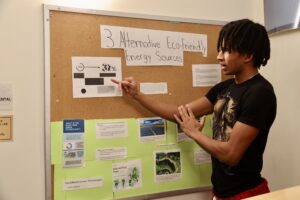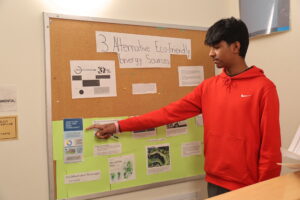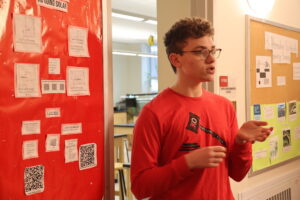January 10, 2024
Science of Climate Change Class Presents Findings
The science of climate change class worked on a semester project driven by the surveys many of our community filled out at the beginning of the year. The students updated the bulletin boards in Chase Tallwood with their research on those topics: solar power at KO, renewable energy, extinction of species, and climate change on an international scale.


As part of the project, these bright young minds presented their findings and answered tough questions by the faculty and administrators.
One student presented his findings regarding the impact of KO switching to solar panels on 25% of our roof space. He shared that Roberts uses 28.3% of energy, saving 211.7 metric tons of CO2; Cafeteria/Library uses 22.5% of energy, saving 168 metric tons of CO2; Seaverns uses 13.2% of energy, saving 98.8 metric tons of CO2; ChaseTallwood uses 13.3% of energy, saving 99.5 metric tons of CO2. Buying these panels outright would cost $90,000 to $194,000; however, there is a tax credit of 30% plus another 10% with U.S.-made panels.
Another student investigated the costs of a homeowner’s switch to solar. It costs approximately $26,000 to install, and the panels’ lifespan ranges from 25-30 years with little maintenance. Homeown
 ers can save $150-$200 off their energy bills.
ers can save $150-$200 off their energy bills.

One presentation focused on species extinction. Alarmingly, one in five species faces extinction, representing up to one million species. The loss of species decreases the biodiversity of our ecosystems, disrupting the food chain and the physical environment. The student found that 91% of his respondents were unaware of any endangered species in Connecticut.
On a global level, the U.S., China, and India are the biggest emitters of greenhouse gases, with 79% of U.S. energy coming from fossil fuels and 13% from renewable energy. 51% of China’s power comes from renewables. Fortunately, in the U.S., wind energy costs are down 70%, and solar costs are down 90%, which may impact our country’s switch to renewables. In 2020, the Chinese set to reduce their emissions by 65% by 2030 from their 2005 levels. This target is not being met due to a mass increase in emissions per capita.
The students were graded on the accuracy and relevance of their findings, the clarity of the information, engagement with the audience, and their ability to answer questions from the audience. The students were poised and knowledgeable of their area of study and did a great job in hopefully making the world, our campus, and our everyday lives more sustainable.
